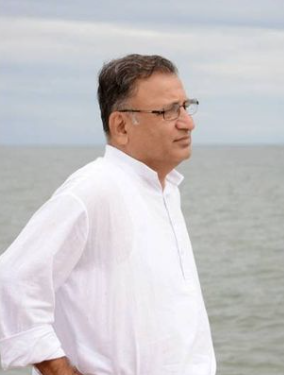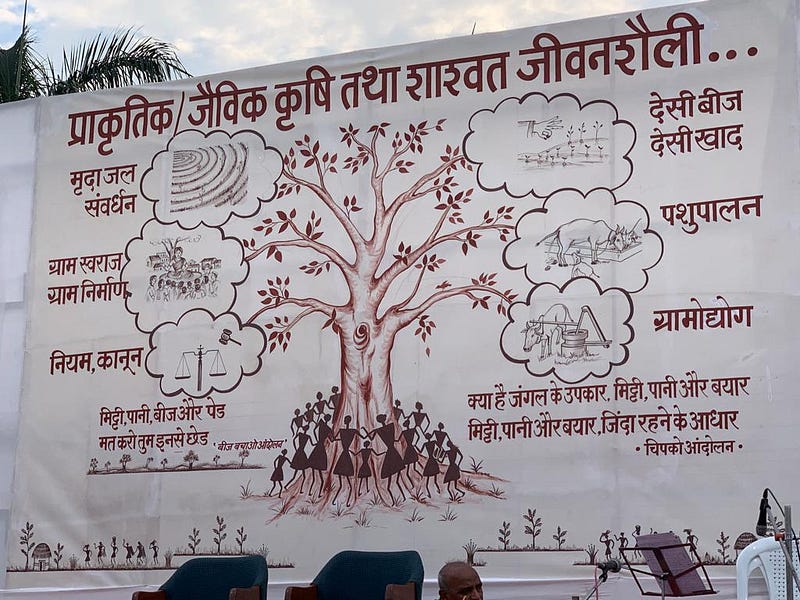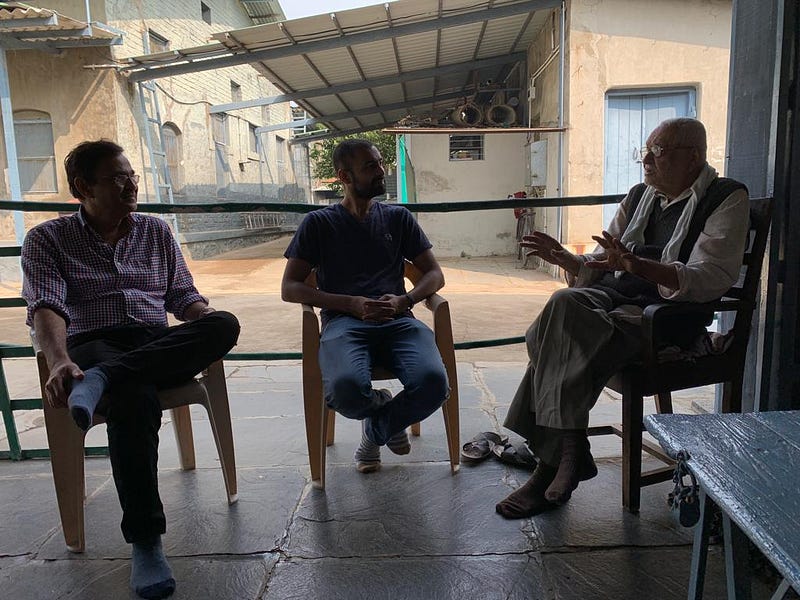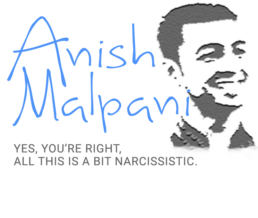Wardha, The Other World
He had taken the train from Wardha to Pune that week — his beloved wife was recovering from knee surgery, and he was obviously going to be there right by her side.
“Anish Beta, when are we talking? Her physiotherapy gets done at 4 pm so I’m free after that.”
My proud uncle had told him about the work that I was trying to do here in Pune, so he might have been curious. But I was a lot more curious.
I had read the only book he had written in English, Towards Holistic Rural Health, and I was floored.
For over forty years, Dr Ulhas Jajoo and his team of student doctors had served over forty neighbouring villages. It all started with basic health check-ups but evolved into something a lot bigger — the overall well-being of the rural poor while driving accountability and long-term sustenance.
But the most compelling part was how the team evolved its thinking.
They iterated on ideas sitting right alongside village folk, collected data, analysed it, charted trends and calculated ratios, conducted experiments, and then scaled interventions that actually worked to other villages.
And this started in 1978.
Before computers and mobile phones were common things. Back when they had to go village to village, person to person collecting data by hand, and doing old-school math on sheets of paper with pencils and scales.
Some decades later, as I sat across from him in Pune in awe, Ulhas Masaji was still more comfortable with his white A4 sheets, and his pen.
“Bol Beta, tell me about you.”
I said, “NO, tell me about you”. But he insisted, and prodded and poked and questioned and took notes on his white A4 sheets, unearthing the why of what I wanted to do.
And I remember thinking: this stalwart of good, bubbling with intellect hidden in the coffers of the non-English world, who had dedicated decades of his life to the poor, wasn’t forcing humility. He just embodied it. He was intrigued by the why of today’s youth, all the while drowning in the purpose of doing good work. Nothing else really mattered.
Those three hours with him were a whirlwind of emotions. As he tucked his pen back into the heart pocket of his self-spun Khadi shirt, he said, “Come to Wardha in December for this event we are hosting.”
And so, I went.
*****
Wardha is a small city close to Nagpur in Maharashtra. It’s somewhat famous because Gandhi spent a lot of time there after 1936, driving the last annals of the freedom movement. His legacy still radiates in the people who live there. People like my adopted Masaji, Dr Ulhas Jajoo.
For the last twenty-eight years, Ulhas Masaji and his family have hosted an annual event that spotlights individuals who have made a telling difference in India – the Tapodhan Shree Krishndas Jajoo Smriti Karyakram. You and I will probably not have heard of most of them because they usually toil in the non-English world, mostly outside of the spotlight.
They invite these heroes into Wardha and ask them to talk about their work, about themselves and what drove them to do the good they do. But what’s extra cool about it is that they also invite local, rural stakeholders to be inspired. It’s more than just some speeches.
For instance, this year’s theme was organic farming. On the first day, organic farmers from the Maharashtra region were invited to engage with the special guests who had oodles of experience sowing seeds sans chemical fertilizers. It was an intimate gathering that focused on depth and conversation and idea exchange — not only from the special guests but also among local peers.
The first guest was Vijay Jardhari from the hills of Uttarakhand. In the 1970s, he had taken part in the Chipko Andolan — the movement in India that inspired tree-huggers across the globe.
He told us about the time when he had held on to a tree to save it. A labourer, employed by the wealthy corporate folks who wanted these trees felled, came over to cut down Vijay’s tree. He resisted, so the labourer hacked at him, busting Vijay’s leg open. Blood flowing out, Vijay refused to budge.
Overwhelmed, the labourer muttered, “I came here to cut trees, not people”, and walked away.
As someone who has ridiculed tree-huggers in the past (both the literal and the metaphorical ones), I was being exposed to a different side, a perspective where I am more wrong than right.
The Chipko Andolan only sowed a seed in what would define Vijay’s main work for years to come.
He went on to start the Beej Bachao Andolan (Save The Seeds) — a grassroots, informal collective of farmers and activists working on saving indigenous seeds in the 1980s while most of Indian agriculture was being lured in by the Green Revolution. They did their own Dandi-march of sorts across Uttarakhand collecting and preserving some 350 types of indigenous seeds.
About 40 years later, the world is now realizing what Vijay intuited way back when — the importance of organic farming and indigenous seeds. Prescience seems to be a thing about people who drive real change.
Today, Vijay champions a holistic, multi-crop approach to farming, called Baranaj (Twelve Crops). Essentially, growing multiple crops is not only good for the soil but is also good for the subsistent farmer — the farmer should at least not go hungry.
Vijay strongly believes that Baranaj prevents farmers’ suicides, a plague rampant across rural agriculture in India. I remember him saying something along the lines of: if a farmer can always feed himself and his family, he might not want to kill himself.
I sat there, taking this all in, as Vijay’s high-pitched Hindi resonated right through my eardrum, deep into my mind.
At one point, Vijay, in the middle of applause and appreciation, said that all this good work was not because of him, but because of his fellow farmers from the hills of Uttarakhand, who no one really knows or talks about, because communication for them isn’t a top priority or a top skill.
As he said this with his hands held together in a deep Namaste, I wept and started to realize that my definition of humility was being redefined.
The second guest was Pandurang Shitole — a local hero of sorts in the realms of organic farming in Maharashtra. While I didn’t agree with everything he said, he was quite the speaker. His humour and intellect, interlaced with tingles of wisdom seemed to encourage (and delight) the organic farmers in the audience.
Ulhas Masaji strongly believes that one of the reasons our farmers struggle is that they’re not really good at selling in the modern world (i.e. at marketing). One reason to bring Pandurang to the foray was to have him share his experience in the art of selling and business. He also encouraged the organic farmers in attendance to create an informal collective of sorts, a collective to share ideas and work together to make everyone better off.
The next morning, they did just this. It was satisfying to eavesdrop on their conversation that brought together varying perspectives, as the old and the young, the fully-organic folk and the partially-organic folk tussled it out, largely respectfully.
The evening saw a more formal affair come to life. The two special guests adorned a stage in front of a larger audience of about 200–300 folks from Wardha. They recited their stories again, although this time, it was a bit shorter, interspersed with Indian classical music dedicated to their work.
It was an inspiring weekend, a weekend that only a few years ago I wouldn’t even be able to imagine, let alone experience.
And deep underneath it all, there was a thread of pure, loving energy that engulfed everything.
This was a free event with no checking of tickets, where all invitees were fed wholesome breakfast, lunch, high tea and dinner. The “caterers” were not caterers — they were like family, cajoling and serving us with love and energy, until saying no felt almost criminal.
The Jajoo family were giving with all their heart, hosting us like we were their children. In some sense, we all were.
As much as I am Indian, I come from a different world.
A world where intellectualism and complex ideas are only communicated in English. Where self-proclaimed effective altruists and “change-makers” analyse problems and hypothesize solutions in fancy PowerPoint presentations while sitting on golden thrones. Where using complicated philosophical jargon and mushy data is enough to direct impact. Where true immersion in the lives of the downtrodden doesn’t seem to be required — no, a week doesn’t count, nor does a year, especially if you can’t speak the language or connect deeply with their culture.
This other world that I saw in Wardha was enshrined with real work, real love, real dedication, real immersion, and I cannot help but think that some of it are lost in translation to the rest of my world. It’s not like this other world is perfect. It has its own issues, where the barriers of language make it harder to access the latest research from around the globe. Where speed and time have different meanings. Where technology can be a hurdle that discourages leaping, anchoring it to a past that might not have all the answers.
So, I can’t help but think that true magic lies at the confluence of these two worlds, where both prosper on the back of each other.
And that’s the confluence I want to embrace, as I oscillate from my world to the other.
This is all just to say that I feel like my veil of ignorance is lifting.
*****
Just when Wardha couldn’t give more, it did.
On our way back to Pune, Dad said we should stop by the Vinoba Bhave Ashram and meet Gautam Bhaiyya.
I imagined Gautam Bhaiyya to be not-so-old, but it turned out he was almost eighty and toothless. Mum urged him to put on his dentures, and then he suddenly seemed a lot younger, with apparently a more familiar smile.
And then he started speaking, still as razor-sharp as a precocious twenty-year-old, going back to the days Mum and Dad had spent with him, how my grandmother was close to him and how he spent a lot of time with Vinoba Bhave.
Now for those not acquainted with Vinoba Bhave, he was a close confidant of Gandhi while being a savant of sorts, speaking many languages, and contributing significantly to the freedom struggle in the 1900s, leading up to our freedom. He was sort of a big deal.
So, when Gautam Bhaiyya said he had spent a lot of time with him, I got curious. What do you mean by “a lot”?
Gautam Bhaiyya casually said that they — Vinoba Bhave and him and other folks — went on a thirteen-year yatra around India on foot, asking for land donations from the upper classes and transferring them to Harijans or low caste folks who were landless. The movement was called Bhoodan.
And the numbers are staggering.
4.4 million hectares of land were donated by 1.8 million people across India. This land was donated to 1.2 million Harijans in what must be one of the greatest voluntary transfers of wealth. And I can’t imagine how many generations of families it has permanently lifted out of poverty since then.
This obviously didn’t curtail my curiosity. When did this happen? How?
The journey started in 1951 when Gautam Bhaiyya was 13 years old. He asked Vinobaji if he could come along, and Bhave said yes — simple as that. He also happened to have a camera with him, a rare thing back in the day, and the pictures he took then are priceless.
As priceless as the book he gifted us on our way out — a picture book he had put together of Vinoba Bhave’s life — photos from his childhood, his encounters with Gandhi, the thirteen-year yatra and his last years.
Gautam Bhaiyya had stayed with my parents in England in the 1980s when he was visiting there to give a lecture in the House of Commons. Ever since, they shared a special connection, a bond that can only be explained by their innate comfort in each other’s presence.
And there I was again, overwhelmed by everything.
Overwhelmed by the audacity of a thirteen-year-old to accompany a legend on a journey that changed so much — without money, with only will. Overwhelmed by the deep-rooted relationships my parents had sown, which decades later still seemed as ripe. Overwhelmed by the work that has been done to rebuild this country in a short 75 years.
All the while, ready to continue building.
*****



